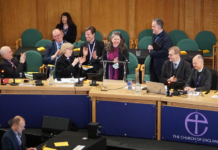A lot of people have been asking for some time whether CEEC would be able to support and work with a proposal for delegated oversight – if that’s what the bishops bring to the General Synod (possibly this July) by way of provision for orthodoxy.
In short – the answer has to be ‘no’ – and for several substantive reasons:
- A proposal for provision based on delegated oversight from orthodox bishops is treating the Prayers of Love and Faith as ‘adiaphora’ – in other words – we can agree to disagree on this (and in which case delegated oversight could be a proportionate response).However – we do not believe this is an ‘agree to disagree’ issue – because the bible is clear that you cannot bless a sexually active relationship outside of male/female marriage.
- It’s a ‘no’ because the delegation of episcopal oversight/care depends upon the goodwill of the diocesan bishop agreeing to the delegation – something which cannot be guaranteed as we go forwards. So…clergy and congregations might find themselves in the situation where they are NOT allowed to have this alternative oversight even if it is supposed to be available.
- It’s a ‘no’ because it does not address the crucial issue of ‘doctrinal assurance’. Delegated oversight still leaves us in a room with two doctrines of sex and marriage – we need some kind of doctrinal firewall between the two (hence CEEC’s repeated insistence over the years that structural differentiation is essential)
- It’s a ‘no’ because this provision is not guaranteed indefinitely. We are seeing this ‘non guaranteeability’ being played out currently regarding the Settlement that was made in order to enable women to be bishops – there are those who are now working to erode the delegated provisions that were made – i.e. delegated is not the same as permanent.
Delegated episcopal oversight might sound reassuringly formal and strong – but in fact it sounds more than it is.
If you would like to think further about this – do have a look at the paper called Guarding the Deposit.



